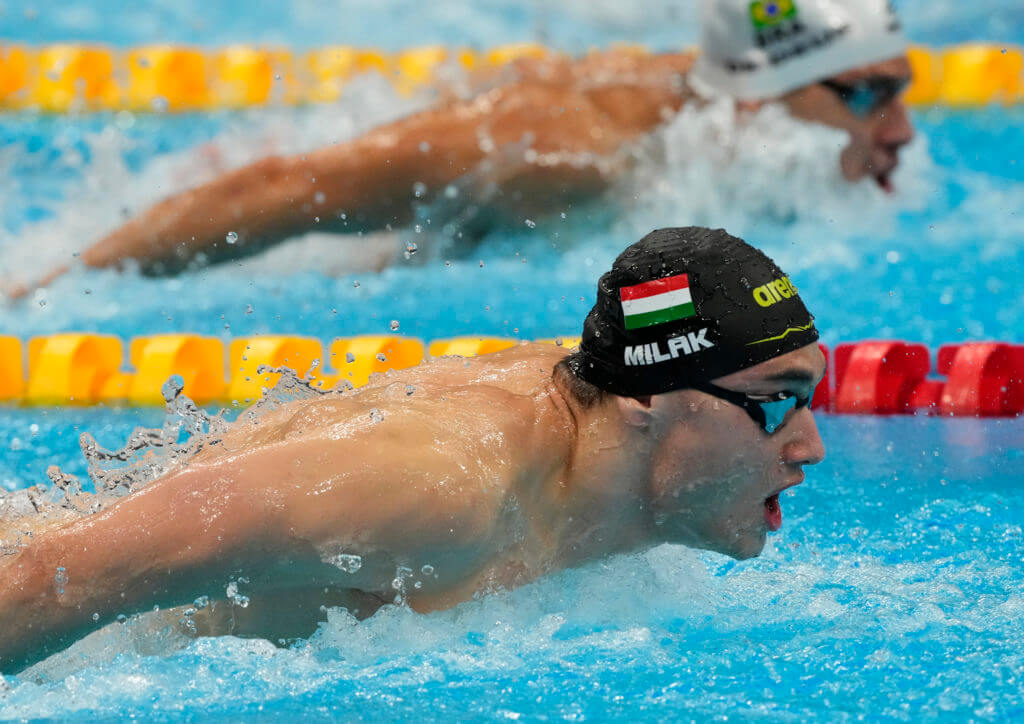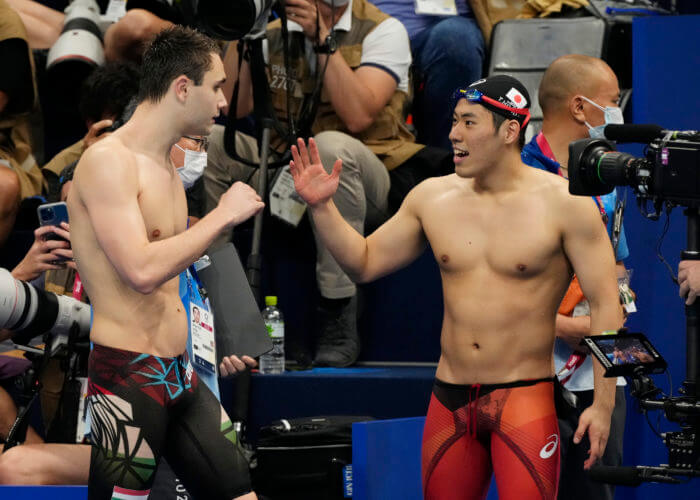Tokyo Flashback: Hungary’s Kristof Milak Blasts Field For Gold in 200 Butterfly

Editorial content for the 2021 Tokyo Olympic Games coverage is sponsored by GMX7.
See full event coverage. Follow GMX7 on Instagram at @GMX7training #gmx7

Tokyo Flashback: Hungary’s Kristof Milak Blasts Field For Gold in 200 Butterfly
One year has passed since the Olympic Games, delayed by a year due to COVID-19, unfolded in Tokyo. To celebrate what went down in the Japanese capital, Swimming World is revisiting the championship finals – each on their one-year anniversary – by once again running the stories that were posted after the medals were decided.
Few Olympic finals – if any, some years – are already-know-the-outcome affairs. On the biggest stage in the sport, multiple athletes jockeying for the podium is the norm, a mistake here or an error there determining the height of one’s step, or absence from the medals ceremony.
Count Kristof Milak in the done-deal category.
Managing the third-fastest time in history, Milak obliterated the field in the 200-meter butterfly at the Olympic Games in Tokyo. The Hungarian allowed the opposition to hang around for the first half of the race, but used his unmatched finishing power to prevail in an Olympic-record time of 1:51.25, a half-second off his world record of 1:50.73. Milak claimed the gold medal by 2.48 seconds, an eternity, with Japan’s Tomoru Honda grabbing silver from Lane Eight in 1:53.73. Italy’s Federico Burdisso picked up bronze in 1:54.45.
The 21-year-old Milak has seemingly been destined for what he accomplished at the Tokyo Aquatics Centre, his career arc an example of a finely drafted blueprint. There was gold in the 200 fly at the 2017 World Junior Championships, followed by a championship in the event at the next year’s Youth Olympic Games. In 2019, behind a world-record performance that erased Michael Phelps’ name from the ledger, Milak claimed the first world title of his career.

Photo Courtesy: Rob Schumacher/USA Today Sports
Capturing an Olympic crown was merely the next objective, and Milak – COVID-19 delay be damned – went emphatic Sharpie to his to-do list checkbox. Milak was out in 24.48 and turned at the 100-meter mark in 53.48, good for third place. A few strokes into the third lap, Milak was in front and expanded his advantage through the finish. Simply, there is no one in the world who can match his combination of endurance and power over the back half.
The way Milak approached the three rounds of his prime event was measured. He eased his way through the preliminaries, posting the top time by nearly a second, only to enhance his effort during the semifinal round. Although still holding back, Milak earned the top seed for the final by nearly three seconds, a message sent to his opposition: You are racing for silver.
The final, then, was his moment to dazzle. It was going to take a little under two minutes for Milak to etch himself as an Olympic champion, and every stroke by the Hungarian was delivered with efficiency and intent. At the wall, Milak had produced his latest masterpiece. He now owns the four-fastest marks of all-time and six of the top-10, with Phelps possessing the other four.
The only thing that could slow him down, he said, was a slight suit malfunction before the race.
“My suit tore 10 minutes before the start of the race, just before entering the call room,” Milak said. “At that moment I knew that the world record was gone, because I was totally off focus.
“When that happens to a swimmer, it could be the goggles, or suit, but just prior to a race, it can destroy your focus, absolutely. I got tense. It was on my face and it was no longer that easy to do what I wanted to do.”
Throughout his rise, Milak has elicited plaudits and respect from Phelps and his longtime coach, Bob Bowman. They have spoken of his back-end excellence, with Bowman extolling Milak’s technique. Considering the Phelps-Bowman relationship generated a record 28 Olympic medals, with the 200 butterfly as a centerpiece, higher praise will not be found.
At these Games, Milak has company as someone seen as unbeatable. Early in the week, Great Britain’s Adam Peaty delivered on his second consecutive Olympic crown in the 100 breaststroke. And American Katie Ledecky entered competition with untouchable status in the distance-freestyle disciplines, a label earned off her dominance in the 800 freestyle and 1500 freestyle.
Honda was a surprise as the silver medalist. Heading into the Games, countryman Daiya Seto was expected to contend for a medal for the home nation, but Seto has missed out on each of his finals in Tokyo, and Honda was left to carry the banner for Japan. In fourth place at every turn, Honda split 29.83 on the last lap to reel in Burdisso. Japan has now medaled in the 200 butterfly at the past five Olympics.
“I’m genuinely just so happy,” Honda said. “When I touched the wall I was so elated. In the semi I put a lot of pressure on myself but in the final I decided to just have fun. I’ve been training to really push it on the last 50m. It felt good and I managed to push myself to the wall.”
It’s also a huge result for Burdisso, who swims at Northwestern.
“I am really happy about the race,” Burdisso said. “The time is not really good, but the important thing is a good touch. I remember in 2018 in Buenos Aires I came third at the Youth Olympics and now to be here on the podium at the Olympics is an honor.”
The 2012 Olympic champion, when he upset Phelps in London, South Africa’s Chad Le Clos was fifth in 1:54.93. The veteran pushed the pace early and had the lead at the 100-meter mark, but faded in the back-half of the race.
Men’s 200 Butterfly
World Record: Kristof Milak, Hungary, 1:50.73 (2019)
Olympic Record: Michael Phelps, United States, 1:52.03 (2008)
Final Results
1. Kristof Milak (Hungary) 1:51.25
2. Tomoru Honda (Japan) 1:53.73
3. Federico Burdisso (Italy) 1:54.45
4. Tamas Kenderesi (Hungary) 1:54.52
5. Chad Le Clos (South Africa) 1:54.93
6. Leonardo de Deus (Brazil) 1:55.19
7. Gunnar Bentz (United States) 1:55.46
8. Krysztof Chmielewski (Poland) 1:55.29




